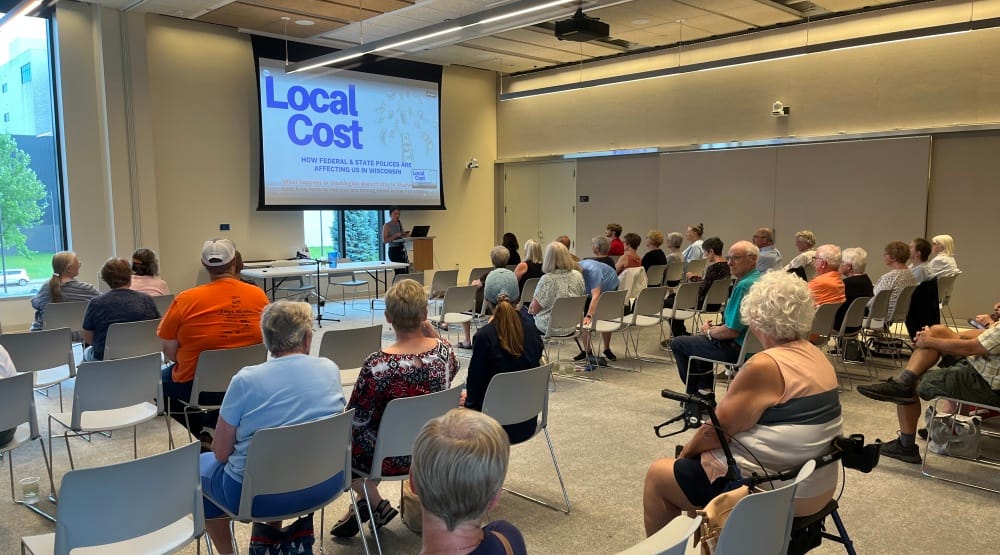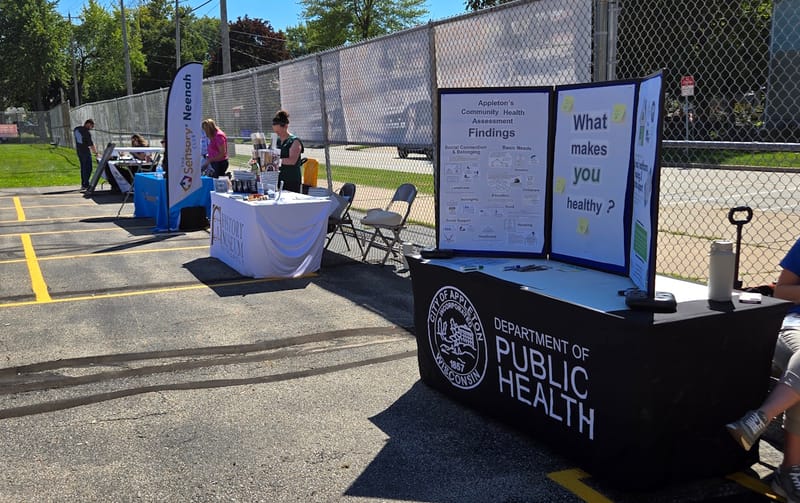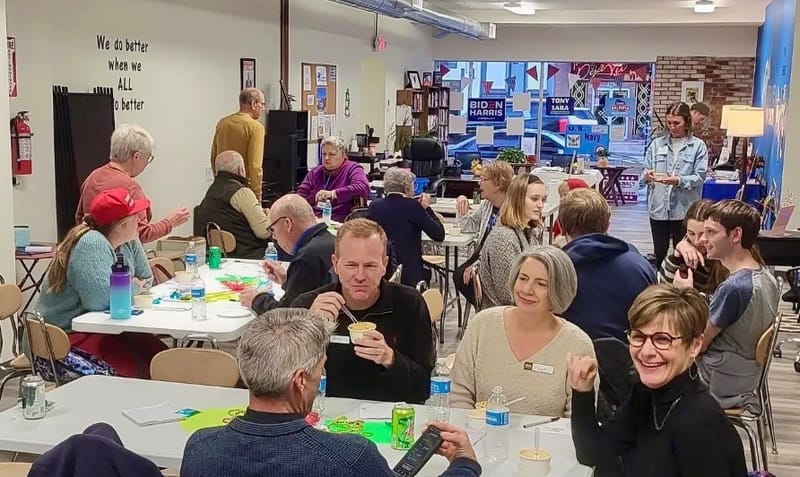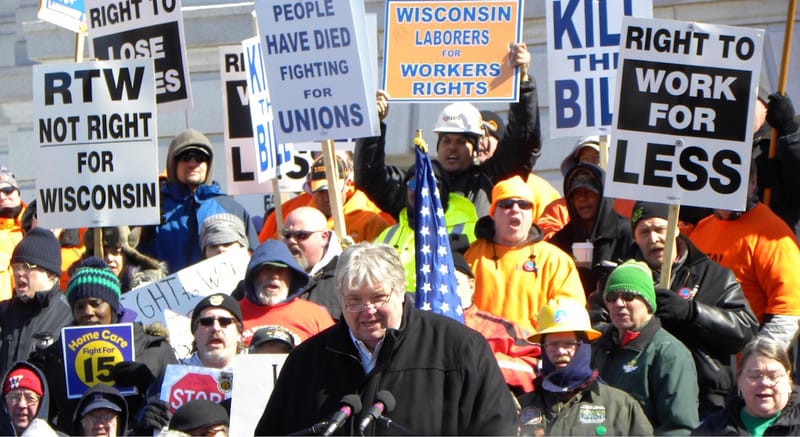'The Local Cost' puts a human face on government policy
There was clear urgency at the Appleton Public Library on June 30 when seven people whose families’ support systems are under threat via government cuts spoke of their personal fears and frustrations.

Taylor spoke about her toddler son and his special needs. Amy and Ben told the story of their two young severely autistic daughters.
For Julie, it was the crisis in the child care industry and for Tanner, the impact of hateful rhetoric on the LGBTQ+ community and the assault on our civil liberties. Alicia, a Navy veteran, shared her concerns about the health of fellow veterans and Edward related stories of his brother with Down syndrome and his daughter with a disability.
All of it came against the backdrop of imminent budget bills at both the state and federal levels. The GOP in the US Senate is wrangling over President Trump’s so-called Big Beautiful Bill, behemoth reconciliation legislation that seeks to make major cuts to the social safety net, including Medicaid. Meanwhile, the Wisconsin legislature is likely set to reject nearly all of the social and economic safeguards put forth in Gov. Evers biennial budget proposal.
Such was the urgency at the Appleton Public Library on June 30 when seven people whose families’ support systems are under threat via government cuts spoke of their personal fears and frustrations.
The event, The Local Cost, was hosted by Forward Outagamie and moderated by Emily Tseffos, a local activist and the head of Fox Valley Indivisible.
Nearly 80 people were on hand to hear the testimonials and calls to action.
“Tonight’s event is not about party lines,” said Tseffos, noting that issues that impact families are neither Democrat or Republican but human. “No matter where we come from or what our politics are, we all want similar things: to raise our kids in safe and stable communities, to care for our loved ones, to have schools we can count on and health care when we need it. And to belong.” Tseffos went on to argue that politicians, by trying to divide us, leave us overwhelmed and even tuned out to what’s actually happening to our fellow citizens.
‘When we act together … we have more power than any system …’
Tanner Ziebell, one of the founders of Hate Free Outagamie, said that while our current politics are indeed the very worst we’ve seen, our system has always to some extent been complicit.
“The Trump administration seems to have officially labeled queer folks and immigrants as undesirables and scapegoat them for problems in society,” he said. “Never mind the $960 billion we’ll be spending on the military this year while 770,000 people lie homeless, and number, by the way, that is criminally underreported and increasing.”
Ziebell said we have two options in the face of the current administration’s assaults on our civil liberties, the working class and families: sell out or resist. The real power, he insisted, sits with the community.
“When we act together, the people in this room have more power than any system designed hundreds of years ago made to benefit a very minute section of the population,” he concluded. “That is what queer folks, what oppressed folks, what femme folks and working folks have always had to rely on and will continue to in the coming years.”
‘It gives my son a chance at life’
Taylor Wilson’s son, Oliver, has Nephropathic Cystinosis, an impossibly rare disease that impacts so few people that no private insurance will discuss covering the hundreds of thousands of dollars he needs to survive. Taylor is a single mom who works full time and Medicaid, she insisted, was the only thing allowing Oliver to survive and her to function as a mom and caregiver. Without the medication that costs $70,000 a month, little Oliver wouldn’t live past ten, she said. “But we have the science,” she said. “We have the technology. We are one of the most lucky families in the rare disease community because there is an FDA-approved treatment for my son. Medicaid is the only thing that gets us access to that. It allows us to exist. It allows us to go through our day to day.”
Taylor concluded with a plea to the humanity underneath all the numbers.
“My child likes dump trucks and dinos and does a lot of two-year-old kind of stuff,” she said “And he deserves to have that kind of life and that kind of a chance. So I implore you to protect families like mine, protect Medicaid, keep the Medicaid budget intact and give my son a chance at life.”
‘We would … be devastated’
Similarly, Amy and Ben Sanders need Medicaid to be able to approximate a life as parents of two severely autistic girls, Charlotte and Aurelia, as well as a neurotypical son, Daniel, who is also impacted by his family’s situation. Whether it’s respite care, Katie Beckett Insurance, communications technology or the essential but outrageously expensive Applied Behavioral Analysis, Medicaid is the lifeline. And special education, funded at only a 30 percent reimbursement by the state of Wisconsin and further threatened by the Trump administration’s dismantling of the Department of Education, was equally important for the girls’ speech, occupational and physical therapy, Amy said.
As a member of the Autism Society Board, Amy said she sees firsthand just how many folks stand to lose and the loss not just for them and their families but for businesses and individuals whose livelihoods are devoted to the care of people such as their daughters.
“I would say that nine out of 10 folks in our community have to leverage some Medicaid service in one way or another, and I don't know what our community would do without this funding,” she said. “We would as a community be devastated and we would see a lot of people dropping out of the workforce.”
Childcare is infrastructure
Julie Stoffel, who owns Cradle to Crayons Learning Center in Kimberly, says child care is infrastructure, pure and simple. The industry suffers, she argues, due to the high cost for parents and the extremely low margins for operators which leads to pay so low for the arduous work of its employees it becomes difficult to retain them. The state, through Covid-relief funds, supported the industry with significant investment – in Wisconsin, that was Child Care Counts – but that funding comes to an end on July 11 and threatens longer wait lists and certain closures.That funding, data shows, kept the industry alive and shortened wait lists for parents.
“If I could make one concise argument for those refusing to act, it would be this,” Stoffel said. “When we invest in early childhood, when we support the professionals who guide brain development and care for our youngest citizens we set the stage for stronger schools, a more stable workforce and healthier communities.
“Failing to fund child care isn’t saving money, it’s passing up on one of the most effective investments we can make in our future.”
‘How do you look someone in the eye …?’
Alicia Saunders is a Navy veteran who is angry about what she sees is the increasing neglect in attitudes toward her fellow vets. She acknowledges it’s always been that way when it comes to the country discarding its soldiers. But with enormous cuts under the current administration to veteran services it threatens even more lives, she insists.
Navy veteran Alicia Saunders speaks at the Local Cost event at the Appleton Public Library on June 30.
“While the campaign speeches talk about honoring our service, the budgets and staffing cuts tell a very different story,” Alicia said, pointing to the vast number of VA employees by the so-called Department of Government Efficiency. “Veterans are taking the brunt of it nationwide. These aren’t empty-desk jobs. These are people who answer the phones at crisis centers, they process our claims, they manage our care. Crisis line operators, those who are on the front lines of suicide prevention, are being cut or pushed to the edge with impossible workloads. Meanwhile veterans are still dying be suicide at alarming rates, nearly 17 a day.
“How do you look someone in the eye and say you support the troops while eliminating the very staff trained to keep us alive?”
‘A richer-lived experience’
Edward Ruffolo knows firsthand what special education means for families. He had a brother who grew up with Down syndrome in an era when such people were tossed aside in institutions. There was no special education nor any government sense of obligation toward kids with such needs. Starting with the Individuals with Disabilities Education Act in 1975 (then under another name), kids with special needs were provided with federal assistance to insure “a free and appropriate public education.”
“I will say that if my brother had been going to school now and not in the fifties and sixties, his outcome would have been much, much better,” he said. “I just know that working people with disabilities, who have community-based employment and more independent living skills have a fuller and richer-lived experience.”
While things are clearly better, Ruffalo fears we’re going in the wrong direction, noting the 30 percent reimbursement rate for special education at public schools (it was once 60), the Department of Education is being dismantled and Republicans in the US House and Senate are threatening to turn Medicaid into block grants to the state.
“What will the states do with those block grants?” Edward asked. “My fear is it could go to support more voucher programs. Will the states cover the shortfalls or will they say these Medicaid waiver programs are not really required by law?
“Not only is there a human cost of it, there’s the economic, societal cost,” he concluded. “If a family simply can’t afford to care for that child anymore, it’s off to the nursing home. It’s off to a much, much greater cost.”






